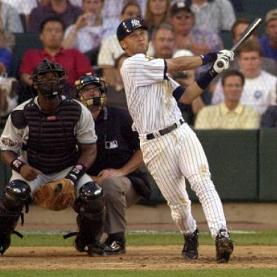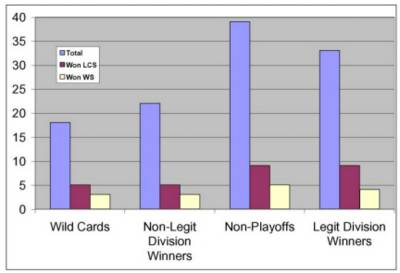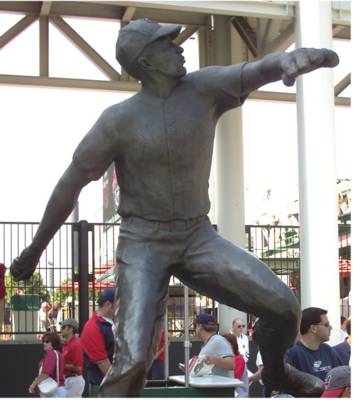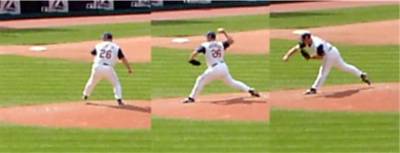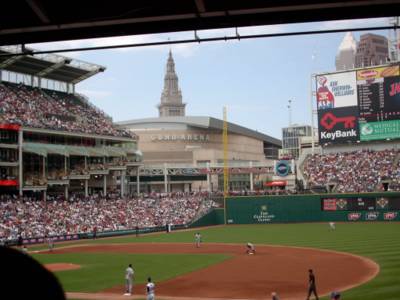Some random thoughts while I watch Saturday night's Yankees-Red Sox game...
I caught this game on the radio, in the second inning, and it was already 3-0 Yankees, so I thought it might be more of the same medicine we were administered in the first two games of this series: An entertaining, eventual Yankee win in which New York was mostly in control, even if the Sox did make it more of a contest at some point in the game. With Kevin Brown pitching tonight, who had been pretty good in his last couple of outings, and a home run from Hideki Matsui already, I figured the game might get out of hand early, and maybe I'd end up watching something from Blockbuster before the clock struck ten PM.
Good thing that DVD isn't due back tomorrow.
Kevin Brown didn't make it past the second inning, after giving up four runs in that inning on a Trot Nixon homer, a Derek Jeter error and a few other hits. The Yanks trailed 4-3 at the end of the second, but that didn't last. Alex Rodriguez hit the 4th pitch he saw over the Green Monster to tie the game. Then a Gary Sheffield walk, a Matsui double and a Bernie Williams RBI single chased Sox starter Bronson Arroyo. Ramiro Mendoza, former Yankees swingman, proved not to be much "relief" as he balked while facing the first batter of his night, Jorge Posada, to score another run, making it 6-4, Evil Empire. Mendoza did retire three straight to get out of the third, but was yanked after hitting Miguel Cairo with a pitch to start the fourth, even though Boston had scored two in their half of the previous inning to tie the score at six apiece.
That happened because Javier Vazquez was brought in to relieve Brown, who was probably so relieved that Vazquez was in there giving up hits and runs instead of him that he punched another wall. Javier has proven himself to be more than an enigma over the course of this season. He's been an absolute disaster, at least since mid-July. An All-Star four months ago, with ten wins and an ERA around 3.50, he's won only four games since, with an ERA of nearly 7.00 in the regular season, and an unimpressive outing in the ALDS against Minnesota (5 IP, 5 ER, 7 hits, 2 walks, 2 HBP) last week.
From watching Vazquez in that third inning tonight, it seems to me that he's got some real issues with his mechanics. His release point is all over the place, as he falls off the mound to the left in his follow through on some pitches, and finishes straight-up facing the plate at other times. He's got a straight three-quarters delivery, but his arm flattens out on his fastball sometimes, which puts a nice tailspin on it, but also keeps it from being a strike fairly often. I am not a pitching coach, but I can pitch a little and I watch a LOT of baseball, so I have some iea what I'm talking about. I don't know why this should be the case, if perhaps Vazquez just thrived in the low-pressure situation of Montreal, but that wouldn't explain how he did so well in the first half of this season in New York.
To his credit, he has pitched better over the last three innings or so than he did in the third, but even though hes kept the Sox from scoring any more, it's been anything but a walk in the (Fenway) park. A walk, three hits, and a few hard-hit outs have kept vazquez on his toes a little, though it's possible that the five to ten-run cushion he's been given has helped him to relax and "trust his stuff". Of course, as I typed that, Jason Varitek hit a 2-run homer to dead-center field, making it 17-8. Three scoreless innings bracketed by two 2-run innings do not constitute a good pitching peformance, in my book. Neverthless, it was enough, and with now 19 runs from the indefatigueable Yankee bats, I suppose I can't complain too much. But Paul Quantrill is pitching now, and he'll do well to endear himself to Joe Torre by giving him another scoreless inning or two.
Speaking of he Yankee bats, how's about an LCS-record 19 runs? They've hit five homers, eight doubles, including two each by Matsui and A-Rod, and every starter except John Olerud has at least one run or RBI. Hideki Matsui holds the ALCS single-game RBI record, with five in Game Two, and another five tonight after his second homer, but also five runs scored in this game, which ties the new record that Matsui now shares with A-Rod.
As you've probably heard, no team in baseball history has ever returned from a 3 games to none deficit to win a seven-game series, The Yankees under Joe Torre have never lost a playoff game in which they scored at least seven runs, and=I'm sure that the 9-run lead they're taking into the ninth inning is a record of some kind as well.
The FOX broadcasters sought out well-known Red Sox fan and author Stephen King, to get his take on things. At the time, the Yanks were only up by seven runs, and King said that if he had the chance to write the story for tonight he would have penned a big, dramatic comeback for the Sox. That doesn't look like it's going to happen. King also plugged his new book, a children's pop-up version of The Girl Who Loved Tom Gordon, who once pitched for Boston but has since Turned to the Dark Side. As Gordon un-Flash-ingly finishes off his former franchise-mates, I doubt that girl fosters much love for him, or for anyone else in a Yankee uniform tonight, as they put yet another nail in yet another Red Sox coffin, burying thir World Series hopes for one more year.
It's just a matter of time now.




